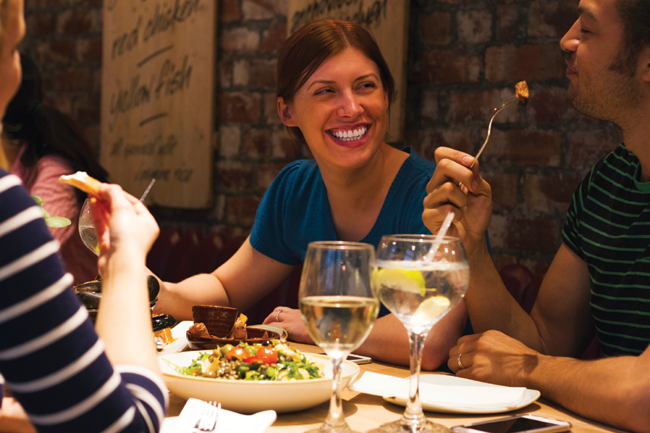It’s hard enough being on a restricted diet in an environment you know, but what about in one you are unfamiliar with? Rebecca Field provides her top tips when travelling abroad to help you continue eating free-from on holiday…

Summer is Here and that means it is time to start thinking about holidays. Whether you are jetting off somewhere warm or staying closer to home, the holiday season is upon us and that provides implications for all those with dietary restrictions – especially those with a gluten intolerance.
While holidays are something which we all look forward to, they do require a bit more planning and thought when you are gluten intolerant. One of the great things about travelling is that you get to experience different cuisines and cultures. With a wide variety of ingredients, flavours and textures on offer it can be confusing as to what you can and cannot try. Depending on your destination, the task of understanding the menu in itself can sometimes be overwhelming and that’s before you start asking questions.
Self-catering is not always the easier option. You have to adjust to the range of products that are available in the local supermarkets and shops; plus of course getting to grips with food labels in a different language. Not the most enviable of tasks.
So what should you be doing to ensure you are able to maintain a free-from lifestyle when on holiday? The key is preparation.

Before You Go
Research the local food
It is always a good idea to research the local food. While gluten and dairy are heavily used in the UK, this is certainly not the case worldwide. If you are heading over to Asia, then this is one of the easiest cuisines to avoid gluten. Dishes are predominantly served with rice, and rice noodles are also common. Fresh, local foods are used in abundance as opposed to pre-packaged options, making it very easy to see what is going into your meal.
Italy is also a good option. You might automatically be thinking of gluten-heavy dishes such as pizza and pasta, but there is a huge selection of meat, fish and fresh vegetables on offer. Plus gluten-free pasta is now widely available. I would also recommend Spain, Greece and Cyprus as having easily adaptable cuisines for a gluten-free lifestyle.
Make enquiries before you book
If you are going to a popular tourist destination, then it is likely that they will be used to receiving requests in relation to food allergies. If you are booking through a travel agent or tour operator, then discuss with them first for some advice and recommendations. If you are booking all aspects of the holiday yourself, then you will have to make your own enquiries before you book. If you do not want to ring the hotel, then email them or even contact them on social media; often this is the fastest way to get a response.
Book what you can in advance
Consider what you can book in advance to make things easier. From your flight meals to any pre-booked excursions, you need to make sure that they are aware of your requirements before you travel.
If you know which restaurants you would like to visit, then take a look at their website. You may find that they already have details about catering for allergies. If not, get in touch and see what can be arranged before you travel. There are online translation tools that you can use to send an email in the local language if needed. You may also find that your hotel is willing to make these enquiries for you.

Get prepared with key phrases
You need to be prepared for the fact that not everyone is going to understand what you can and cannot eat. Having some key phrases to use in hotels and restaurants is going to make your life easier. Having a list of all the base ingredients which you cannot eat such as wheat flour, buckwheat, couscous etc. in the local language is going to help get all your requirements across.
If you are self-catering, then be aware that not all countries have the same labelling requirements as the UK. You may find that nutritional information is provided, but not a complete list of ingredients. Even if the ingredients are provided, you may struggle to understand if they are not provided in English.
Check out dietary restaurant cards. They are available in 17 languages from www.dietarycard.co.uk which include useful phrases in the local language, details of brands to look out for as well as the legal labelling requirements.
On the day
Pack some supplies
Even the best-laid plans can go wrong at the last minute, so it is always advisable to be prepared. Pack some snacks that will travel well and any of your favourite brands that you might want to take with you if you are self-catering. Keep to pre-packaged sealed products, as fresh products will not only travel badly, but are likely to be flagged by customs.
Unless you know that you can get a gluten- dairy-free meal at the airport/train station/service station etc, you should pack a meal to take with you. Be prepared for any delays.

When you get there
Speak to your hotel
If you have been corresponding with a particular person at your hotel, then make sure you are introduced to them when you arrive. Double check that any pre-bookings you have made have all been notified and arrangements are in place. It will be easier to clarify any issues beforehand rather than waiting until the day.
If in doubt:
If you are ever in doubt, then stick to dishes you know will be gluten- or dairy-free. As the holiday progresses you will most likely find it much easier to get across your requirements and can become a bit more adventurous.
Most importantly, you need to make sure you relax and enjoy your holiday. A little bit of preparation really will go a long way and makes all the difference.
